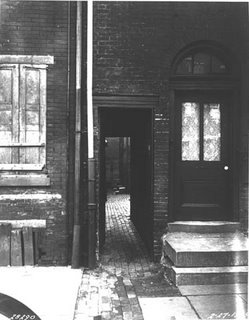 There aren't any images of Abraham Lincoln Gillespie, that I could find, so instead here is one of South Philadelphia in the 1930s. He was born there in 1895, and returned at the start of the Depression, from expat Paris in the 20s.
There aren't any images of Abraham Lincoln Gillespie, that I could find, so instead here is one of South Philadelphia in the 1930s. He was born there in 1895, and returned at the start of the Depression, from expat Paris in the 20s.It's somewhat amazing, perhaps even unbelievable, that Gillespie is so little known (though his work is now, barely, anthologized in a few places) and under-represented on the Internet, as well. Having read what I can find of his life, and having seen a few of his poetic texts, you'd think he'd be more widely recognized as the eccentric genius that he is.
For make no mistake, few writers in the 20th century have had such a shabby treatment at the hands of posterity, or such a strange trajectory while alive. ALG took a creative turn, after being married to an orphaned sweetheart, after a jolting auto accident, that sent him spiraling into the orbit of James Joyce, Gertrude Stein and Ezra Pound in the cafes of Paris.
Claiming himself to be the world's greatest writer, disfigured after the crash, and semi-destitute, he implausibly forged an entirely unique way of speaking and writing that actually pushes the modernist innovations of his far more respected peers way past limits most care to want to think about. Though perhaps not as theoretically, or emotionally, estranged as Khlebnikov, ALG was similarly constructing a new way for typography and language to appear on the page, and challenging, in the process, the relationship between word and world.
What is very sad is that, after moving in the highest literary and artistic circles possible, ALG moved back to the run-down and desultory cafes of Philadelphia of the Great Depression, where his visionary practices were barely tolerated, and he became, more or less, a mascot for second-rate Bohemians (and curiously, some famous Hollywood screenwriters) who encouraged this diabetic alcoholic with the bum leg to hang around their gin-soaked apartment parties and tell stories of his time at the apex (albeit marginally) of 20th century Kulchur. At his funeral, no one in his family knew he was a writer of genius; and his occupation on his death certificate was marked as None. Fitting epitaph, perhaps, for the saddest, weirdest, lost man of language.
He deserves better now, though.
http://www.ubu.com/historical/gillespie/gillespie.html
I've gleaned most of this from the interesting, if sparse, material gathered at the site above.
I also asked the intrepid younger poet, Adam Fieled (see his P.F.S Post in the Links), who lives in the Philadelphia of today, to write a literary postcard that might locate the man in the place. Here is what he sent me:
In the Great Depression-era 30s, a cup of coffee in funky, ethnic South Philly would’ve cost Abraham Lincoln Gillespie five cents. In near-Depression era 2006, a good cup of South Philly coffee runs at $1.35. Still, the spirit of the place seems remarkably unchanged. The heart of South Philly still remains the Italian Market on 9th Street, where (one imagines) Gillespie would’ve picked up whatever victuals he could afford. Gillespie’s personality, as it has been handed down to us by anecdote, fits the South Philly vibe to a tee: bombastic, ornery, volatile, ready to take on all comers.
Gillespie’s stubborn literary individualism earned him a life of abject obscurity (though his reputation is gradually widening, & he is taught at Penn & elsewhere). Likewise, Philadelphia has devolved from the nation’s first capital & an industry leader into a second-tier city in the US hierarchy. Tell that to a South Philadelphian, however, and you’re likely to get punched. Philly is a proud city, the Dublin of the East Coast (& in fact “Bloomsday” is widely celebrated here); South Philly is its proudest neighborhood.
The very spirit of South Philly is embodied in the huge mural of former Philadelphia mayor Frank Rizzo that broods over the Italian Market from 9th & Salter. Rizzo was Philly’s first “Goomba” mayor, the first in the country, in fact. He was an incredible tough-guy & the ultimate South Philly boy made good. You can feel his presence in the hard-case vendors & shop-keepers, in the smell of onions & frying meat, in an atmosphere of barely suppressed rage & exultant joy. It’s a vibe we can also sense in Abraham Lincoln Gillespie’s mad, hectic word-frenzies. Joyce’s Dublin & Abraham Lincoln Gillespie’s Philly are close to being the same place: redolent & reeking, furious & placid, sensuous & austere.
Comments
I am thrilled to see your entry (and a positive one!) on Abraham Lincoln Gillespie.
I have an odd connection with Gillespie, as my grandfather, William Christy Blood, was the owner and driver of the car that overturned as a result of a most fateful collision with Gillespie. It was an event that would forever shape Gillespie's thoughts, outlook and quality of life.
My grandfather, who survived the accident, lived on with the guilt of the events of that day and how changed Gillespie was as a result.
My grandfather was an modestly celebrated artist himself, a painter. He was born just 5 years after Gillespie, also in South Philly, and died on September 11, 1957, approximately 7 years after Gillepie's death.
I uncovered this story quite by accident and am now fascinated with the retelling of Gillespie's life and story.
http://www.retrosixty.co.uk/stock/0970.html